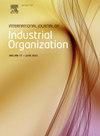医院市场对全民健康保险有何反应?
IF 1.4
3区 经济学
Q2 ECONOMICS
International Journal of Industrial Organization
Pub Date : 2025-08-19
DOI:10.1016/j.ijindorg.2025.103190
引用次数: 0
摘要
摘要本研究透过检视全民健保实施对医院结构的影响,来探讨全民健保改革对医疗供给的影响。保险范围的大幅增加增加了需求,但也大大缩小了医院之间的价格差异。我们使用改革前未参保老年人比例的地区差异来确定国家医疗保险的这些后果如何影响医院。我们发现,改革导致医院数量显著减少,而退出的大多数是提供较少服务和雇用较少医生的小医院。对单个医院投入选择和利用率的考察表明,大医院增加了人员配备水平和其他投入,并且使用率更高,而小医院则没有;相反,很多都变成了诊所。结果表明,全民健康保险的引入使大医院扩大和繁荣,而小医院保持不变或退出。本文章由计算机程序翻译,如有差异,请以英文原文为准。
How do hospital markets respond to universal health insurance?
This paper studies the effects of universal health insurance reform on health care supply by examining how the implementation of National Health Insurance (NHI) in Taiwan affected the structure of the hospital sector. The massive increase in insurance coverage increased demand but also greatly reduced price differentials among hospitals. We use regional differences in the proportion of uninsured elderly before the reform to identify how these consequences of NHI affected hospitals. We find the reform resulted in a significant decrease in the number of hospitals, and that most of those exiting were small hospitals that offered fewer services and employed fewer doctors. Examination of the input choices and utilization rates of individual hospitals shows that large hospitals increased staffing levels and other inputs, and experienced higher utilization rates, while small hospitals did not; instead, many became clinics. The results suggest that the introduction of universal health insurance caused large hospitals to expand and prosper while small hospitals remained the same size or exited.
求助全文
通过发布文献求助,成功后即可免费获取论文全文。
去求助
来源期刊
CiteScore
2.50
自引率
6.70%
发文量
48
审稿时长
77 days
期刊介绍:
The IJIO is an international venture that aims at full coverage of theoretical and empirical questions in industrial organization. This includes classic questions of strategic behavior and market structure. The journal also seeks to publish articles dealing with technological change, internal organization of firms, regulation, antitrust and productivity analysis. We recognize the need to allow for diversity of perspectives and research styles in industrial organization and we encourage submissions in theoretical work, empirical work, and case studies. The journal will also occasionally publish symposia on topical issues.

 求助内容:
求助内容: 应助结果提醒方式:
应助结果提醒方式:


